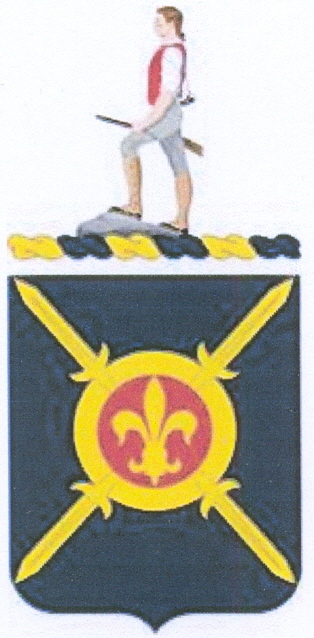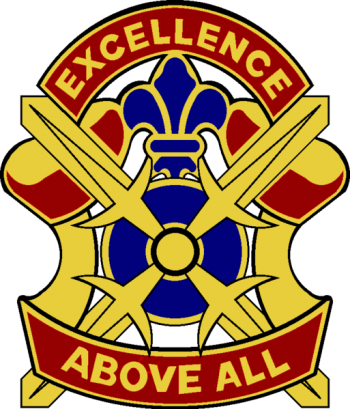381st Replacement Battalion, US Army: Difference between revisions
Knorrepoes (talk | contribs) m (Text replacement - "|Arms of {{PAGENAME}}]]" to "|Coat of arms (crest) of {{PAGENAME}}]]") |
Knorrepoes (talk | contribs) m (Text replacement - "↵↵↵Literature" to " Literature") |
||
| Line 21: | Line 21: | ||
The coat of arms was approved on 8 November 1996. The distinctive unit insignia was originally approved for the 381st Replacement Battalion on 13 August 1971. It was redesignated for the 381st Personnel and Administration on 19 April 1972. The insignia was redesignated for the 381st Replacement Battalion, with description and symbolism revised on 22 October 1990. | The coat of arms was approved on 8 November 1996. The distinctive unit insignia was originally approved for the 381st Replacement Battalion on 13 August 1971. It was redesignated for the 381st Personnel and Administration on 19 April 1972. The insignia was redesignated for the 381st Replacement Battalion, with description and symbolism revised on 22 October 1990. | ||
Revision as of 19:04, 20 August 2023
381ST REPLACEMENT BATTALION, US ARMY
| (Coat of Arms) |
(Distinctive Unit Insignia) |
Official blazon
Shield: Azure (Dark Blue), a bezant charged with a torteau radiating four sabers, points to border saltirewise Or and bearing a fleur-de-lis of the last.
Crest: That for the regiments and separate battalions of the Army Reserve: From a wreath Or and Azure (Dark Blue), the Lexington Minute Man Proper. The statue of the Minute Man, Captain John Parker (H.H. Kitson, sculptor), stands on the Common in Lexington, Massachusetts.
Motto: EXCELLENCE ABOVE ALL.
Distinctive Unit Insignia. Description: A gold color metal and enamel device 1 1/8 inches (2.86 cm) in height overall, consisting of a gold pommel issuing four gold swords saltirewise, hilts and pommel on a dark blue disc below a dark blue fleur-de-lis, all with a continuous red scroll arched across the top passing behind the upper blades doubled gold at the sides and passing over the blades in base, inscribed “EXCELLENCE” at the top and “ABOVE ALL” in base, all in gold letters.
Origin/meaning
Dark blue and scarlet are the colors traditionally associated with the Adjutant General’s Corps. The fleur-de-lis refers to the unit’s participation in the Rhineland Campaign during World War II. The disc signifies continuity, the sword is symbolic of authority, the saltire simulates a turnstile. Together they represent the supervised and controlled processing aspects of the unit’s mission.
Distinctive Unit Insignia: Dark blue and scarlet are the colors traditionally associated with the Adjutant General’s Corps. The fleur-de-lis refers to the unit’s participation in the Rhineland Campaign during World War II. The disc signifies continuity, the sword is symbolic of authority, the saltire simulates a turnstile, and together they represent the supervised and controlled processing aspects of the unit’s mission.
The coat of arms was approved on 8 November 1996. The distinctive unit insignia was originally approved for the 381st Replacement Battalion on 13 August 1971. It was redesignated for the 381st Personnel and Administration on 19 April 1972. The insignia was redesignated for the 381st Replacement Battalion, with description and symbolism revised on 22 October 1990.
Literature: Information from The Institute of Heraldry, US Army.

